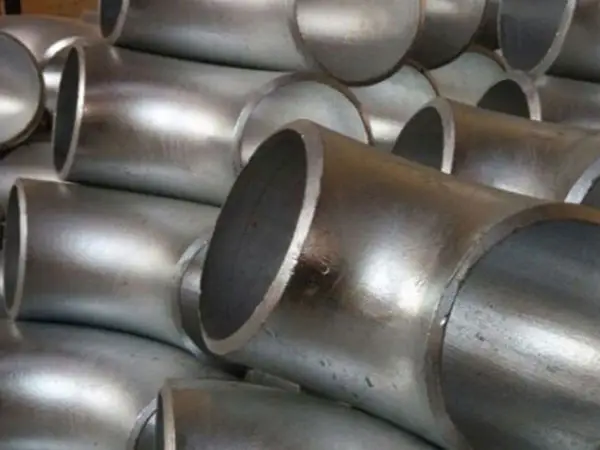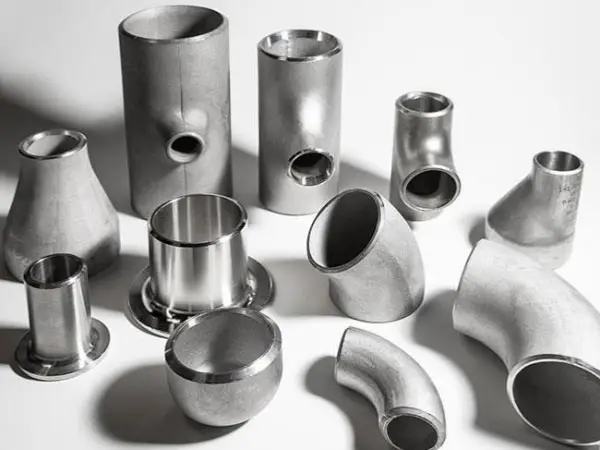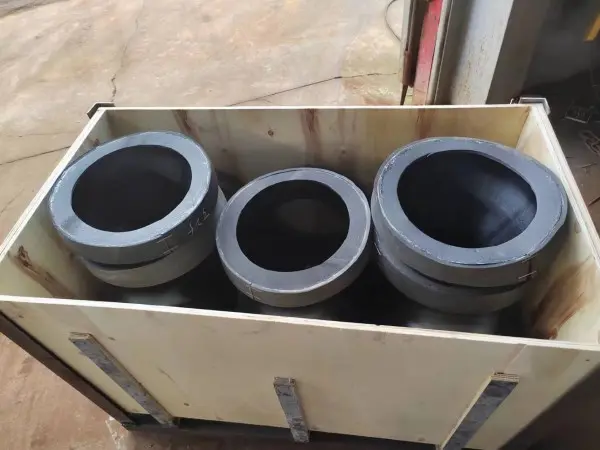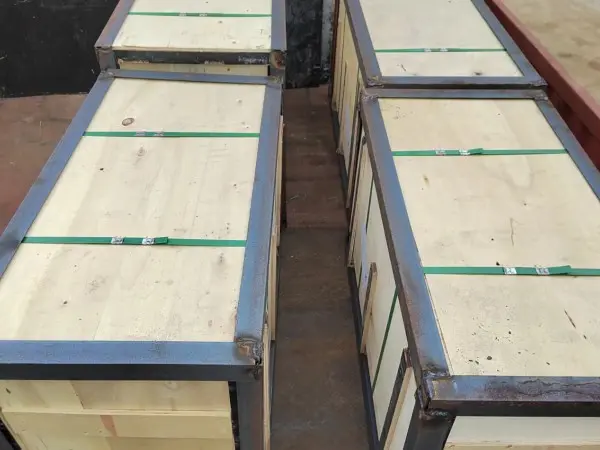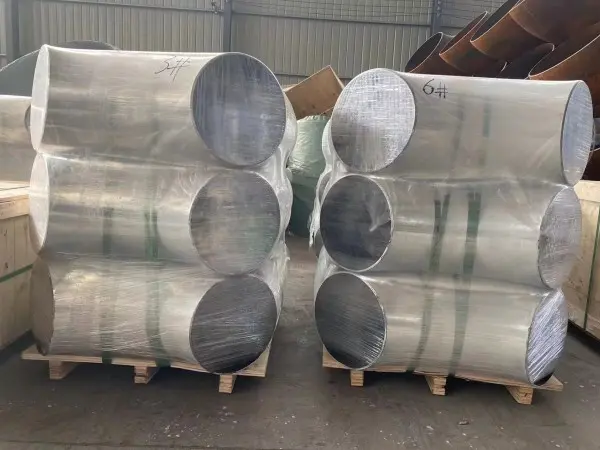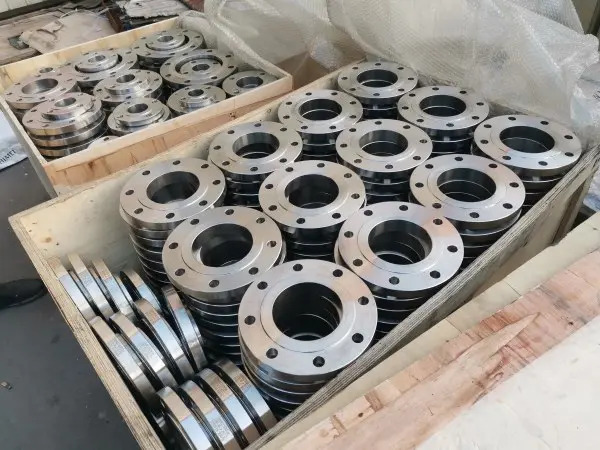- No.101 Wanbo 1st Road, Nancun Town, Panyu District, Guangzhou, Guangdong, China
- 0086-020-84886013,84886093,84886091,84886012
- sales@finegosteel.com
Flange&Pipe Fittings
ASTM A403 Pipe Fittings
ASTM A403 standard specification covers the standard for wrought austenitic stainless steel fittings for pressure piping applications. ASTM A403 / A403M standard specification for wrought austenitic stainless steel piping fittings.
ASTM A403 wpl6 elbow after complete quality and performance measure inspection. these are widely appreciated for excellent quality, corrosion abrasion and high tensile strength with long life service.
Standard
Specification
The material for fittings shall consist of forgings, bars, plates, or seamless or welded tubular products. Forging or shaping operations shall be performed by hammering, pressing, piercing, extruding, upsetting, rolling, bending, fusion welding, machining, or by a combination of two or more of these operations. All fittings shall undergo heat-treatment. Chemical and product analyses shall be performed and shall conform to the required chemical composition in carbon, manganese, phosphorus, sulfur, silicon, chromium, molybdenum, and titanium. Tension test shall be done on the fitting material to determine the tensile properties such as yield strength and tensile strength. Fittings supplied under this specification shall be examined visually for surface discontinuities, surface checks, and mechanical marks.
What grade of steel is ASTM A403?
The standard includes several grades of austenitic stainless steel alloys, and uses the WP or CR prefix to mark the grade of steel, depending on the applicable ASTM or MSS size and rated pressure standards. ASTM A403 is designed for forged steel pipe fittings, Cast pipe fittings are not suitable.
Chemical Composition (%) of ASTM A403:
|
Steel No. |
Type |
C |
Si |
S |
P |
Mn |
Cr |
Ni |
Mo |
Other |
ób |
ós |
δ5 |
|
WP304 |
0.08 |
1 |
0.03 |
0.045 |
2 |
18-20 |
8-11 |
|
|
515 |
205 |
28 |
|
|
WP304H |
0.04-0.1 |
1 |
0.03 |
0.045 |
2 |
18-20 |
8-11 |
|
|
515 |
205 |
28 |
|
|
WP304L |
0.035 |
1 |
0.03 |
0.045 |
2 |
18-20 |
8-13 |
|
|
485 |
170 |
28 |
|
|
WP304LN |
0.03 |
0.75 |
0.03 |
0.045 |
2 |
18-20 |
8-10.5 |
|
N2:0.1-0.16 |
515 |
205 |
28 |
|
|
WP304N |
0.08 |
0.75 |
0.03 |
0.045 |
2 |
18-20 |
8-11 |
|
N2:0.1-0.16 |
550 |
240 |
28 |
|
|
WP309 |
0.15 |
1 |
0.03 |
0.045 |
2 |
22-24 |
12-15 |
|
|
515 |
205 |
28 |
|
|
WP310 |
0.15 |
1.5 |
0.03 |
0.045 |
2 |
24-26 |
19-22 |
|
|
515 |
205 |
28 |
|
|
WP316 |
0.08 |
1 |
0.03 |
0.045 |
2 |
16-18 |
10-14 |
2-3 |
|
515 |
205 |
28 |
|
|
WP316H |
0.04-0.1 |
1 |
0.03 |
0.045 |
2 |
16-18 |
10-14 |
2-3 |
|
515 |
205 |
28 |
|
|
WP316LN |
0.03 |
0.75 |
0.03 |
0.045 |
2 |
16-18 |
11-14 |
2-3 |
N2:0.1-0.16 |
515 |
205 |
28 |
|
|
WP316L |
0.035 |
1 |
0.03 |
0.045 |
2 |
16-18 |
10-16 |
2-3 |
|
485 |
170 |
28 |
|
|
WP316N |
0.08 |
0.75 |
0.03 |
0.045 |
2 |
16-18 |
11-14 |
2-3 |
N2:0.1-0.16 |
550 |
240 |
28 |
|
|
WP317 |
0.08 |
1 |
0.03 |
0.045 |
2 |
18-20 |
11-15 |
3-4 |
|
515 |
205 |
28 |
|
|
WP317L |
0.03 |
1 |
0.03 |
0.045 |
2 |
18-20 |
11-15 |
3-4 |
|
515 |
205 |
28 |
|
|
WP321 |
0.08 |
1 |
0.03 |
0.045 |
2 |
17-20 |
9-13 |
|
Ti:5C-0.7 |
515 |
205 |
28 |
|
|
WP321H |
0.04-0.1 |
1 |
0.03 |
0.045 |
2 |
17-20 |
9-13 |
|
Ti:4C-0.7 |
515 |
205 |
28 |
|
|
WP347 |
0.08 |
1 |
0.03 |
0.045 |
2 |
17-20 |
9-13 |
|
Nb+Ta:10C-1.1 |
515 |
205 |
28 |
|
|
WP347H |
0.04-0.1 |
1 |
0.03 |
0.045 |
2 |
17-20 |
9-13 |
|
Nb+Ta:8C-1 |
515 |
205 |
28 |
|
|
WP348 |
0.08 |
1 |
0.03 |
0.045 |
2 |
17-20 |
9-13 |
|
Ta:0.1 |
515 |
205 |
28 |
|
|
WP348H |
0.04-0.1 |
1 |
0.03 |
0.045 |
2 |
17-20 |
9-13 |
|
Ta:0.1 |
515 |
205 |
28 |
|
Notes:
Mechanical properties of ASTM A403:
|
Grade |
UNS |
Tensile Strength, min |
Yield Strength,min |
Elongation min % in 4D |
|||
|
|
|
ksi |
MPa |
ksi |
MPa |
Longit % |
Trans% |
|
ALL |
ALL |
75 |
515 |
30 |
205 |
28 |
20 |
|
304L |
S30403 |
70 |
485 |
25 |
170 |
28 |
20 |
|
316L |
S31603 |
70 |
485 |
25 |
170 |
28 |
20 |
|
304N |
S30451 |
80 |
550 |
35 |
240 |
28 |
20 |
|
316N |
S31651 |
80 |
550 |
35 |
240 |
28 |
20 |
|
S31726 |
80 |
550 |
35 |
240 |
28 |
20 |
|
|
XM-19 |
S20910 |
100 |
690 |
55 |
380 |
28 |
20 |
|
S31254 |
94-119 |
650-820 |
44 |
300 |
28 |
20 |
|
|
S34565 |
115 |
795 |
60 |
415 |
28 |
20 |
|
|
S33228 |
73 |
500 |
27 |
185 |
28 |
20 |
|
Process
Heating: The raw material is heated to a temperature that softens it and makes it malleable. The temperature varies depending on the type of material being used. Heating is typically done using a furnace or induction heating equipment.
Forging: The heated metal is then placed in a forging press, where it is compressed and shaped using high-pressure and specialized dies. Forging presses can be hydraulic, mechanical, or pneumatic depending on the size and complexity of the product being manufactured.
Trimming: After the forging process, the excess material is trimmed off to create a finished product. Trimming can be done using a variety of tools including saws, grinders, and shears.
Machining: If necessary, the forged pipe fittings may undergo further machining to create specific shapes or features. Machining is typically done using lathes, mills, or drilling machines.
Inspection: The finished fittings are inspected to ensure they meet quality standards and specifications. Inspection can be done using a variety of tools including calipers, micrometers, and ultrasonic testing equipment.

 Language
Language





